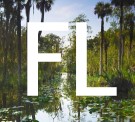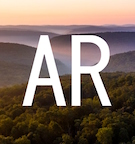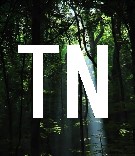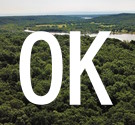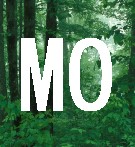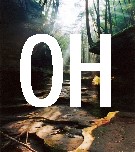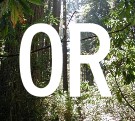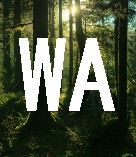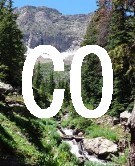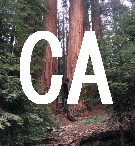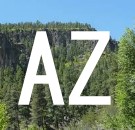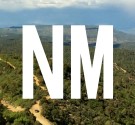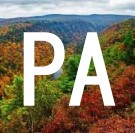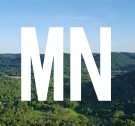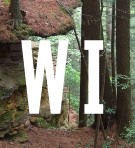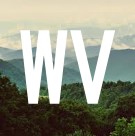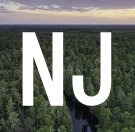|
Wednesday, September 20
Most expedition members were up by 9 AM. The sun was out, although it was much
cooler than the day before. Immediately after breakfast, several team members set
out to search the clearcut to the northwest of camp for any sign of the previous
night's visitation. Both Randles and Noll found large impressions along a ravine that
bisected the clearcut to the west of camp. The ravine ran roughly north to south, and was about
50 feet deep, providing ample cover for any animal wanting to traverse the clearcut.
Randles print, though interesting, was inconclusive. However, Noll's print find was
rather compelling. Noll found the impression about 150 yards from camp. It was located in
an old section of a moss-covered deadfall tree that was half-buried in the earth, and lay just inside the treeline.
The print measured 17 inches in length, and was very fresh (less than 24 hours). 3 feet
further along the tree, a section had been freshly crushed. This suggests that the subsequent
footstep of the animal that left the first print had found a weak spot in the deadfall, which gave way
under it's weight.

17-inch Impression in Log found
by Rick Noll.
NOTE: Noll's bootprint is
visible to the left of the impression.
Photo by Rick Noll.
Fish also took a lenghty hike, travelling northeast around the northern
end of Hilltop, and towards Skookum Meadow. His walked turned up
some interesting prints, but nothing conclusive. Meanwhile, a few
participants had decided to travel to the small town of Eagles Cliff to
take advantage of their shower facilities.
After lunch Noll, Lemley and Bambenek did some exploring to the west
of basecamp, via Noll's vehicle. The cloud cover had steadily increased throughout the morning,
and it was now completely overcast. They managed to find an old logging road
that took them out to the edge of the ridge located directly west of the encampment.
They walked out to the end of the overgrown road, and located a rocky outcrop that
offered an excellent view of basecamp and the clearcut surrounding it. While checking out another
small road that spurred off of this one, they located an abandoned campsite. There was a
good deal of debris left behind by the occupants, including a tent, clothing, magazines,
and trash. It appeared to have been left from several months prior.
Noll, Lemley and Bambenek returned to camp. After some brief discussion,
it was decided that the Thermal and Infra-red cameras should be placed on the rocky
outcropping overlooking the clearcut. This location became known as Ridgetop. Lemley, returned
to Ridgetop, accompanied by Fish, and Pugsley and Searle from the film crew. All agreed that
this would be the best vantage point to film from after dark.

View of Basecamp from Ridgetop.
Photo by Dr. LeRoy Fish.
Alan Terry arrived at 6 PM to join the expedition for the next 2 days. Terry had been considerable help to the
group already, as he had arranged for our communications gear, courtesy of Furuno USA, and had also managed to
round up a couple of 130 lb deep-cycle batteries that we used to recharge all of the camcorder and radio
batteries.
After dinner, the group set about tending to their assignments. Henick and Powell hiked back into Skookum Meadow,
Terry and Bambenek manned Hilltop, and Lemley took the film crew up to Ridgetop. Moneymaker, Noll, Randles, and Fish
stayed in basecamp. The broadcasting system had been moved from Hilltop to the end of the road near basecamp, with the hope that
an animal in the area could be drawn in close for the cameras.
Broadcasting began shortly after 10:00 PM. The cloud cover that had been rather thick in the afternoon had pushed on through,
and the skies were once again clear. The temperature had dropped quickly, and was already near freezing when the
operations commenced. The first set of calls were met by a chorus of coyotes, which were about a mile or more northwest
of camp. It remained quiet through the next 2 series of calls, but this would not be the case for the entire night.
The first bit of excitement came shortly after the third set of calls, when the radios came to life with Noll exclaming
"We just had an explosion in camp!!" One of the power inverters that was connected to the 12-volt batteries for recharging
purposes had decided to blow up in a rather dramatic fashion. A loud "POP" was accompanied by a shower of sparks and plums of smoke eminating
from the kitchen/supply area of camp. Fortunately, it did not start a fire, and no electronic components were damaged. We even managed to revive the
unit the following day.
While Noll was assessing the damage at camp, Lemley and the film crew had a bit of a scare at Ridgetop.
Their activity had managed to attract the attention of a local mountain lion, which had snuck up to within
15 feet of the group. It was nearly pitch dark out, as the moon had not yet risen above the horizon, and the foursome were
concentrating on the ravine and clearcut to the east of their position. The visiting cougar was
only noticed when film crew member John Mort turned to look behind them. He immediately notified the other three that there was "something
right behind us." Several tense moments passed before the animal silently slipped away into the trees. Searle and Pugsley tried to get
the cameras turned around to view the cat, but it was too late to get it on film. A few minutes later the mountain lion let out a low growl,
as it proceeded off to the crew's north.

Night Vision shot of clearcut and ridge
to the west of basecamp.
Photo by Rick Noll.
It was now approaching 11:30 PM. The temperature had dropped below freezing, and there was a very slight
breeze that made it very hard to stay warm. Moneymaker played another series of screams. Just a few moments after
broadcast, a series of three very loud screams came from about 400 yards east of camp. They sounded very similiar to
the calls we were broadcasting, but were longer, louder, much clearer, and had a very ragged quality at the end of each scream,
similiar to a person clearing their throat. Just as the third call faded out, several coyotes started wailing to the south of camp,
and they were soon joined by another group of coyotes to the northwest of camp.
 Team members Alan Terry and Dr. Greg Bambenek were the closest to the source of the calls. They estimated
their distance from the screams at about 100-150 yards, and to their southeast. This would place the source on the
east side of the ridge leading to Hilltop camp. Terry and Dr. Bambenek stated that they were standing there with their
mouths gaping in wonder for a moment, before becoming suddenly concerned that whatever large animal had
just let out that scream may be coming down the road right towards them, and that it may not be in a friendly mood.
Team members Alan Terry and Dr. Greg Bambenek were the closest to the source of the calls. They estimated
their distance from the screams at about 100-150 yards, and to their southeast. This would place the source on the
east side of the ridge leading to Hilltop camp. Terry and Dr. Bambenek stated that they were standing there with their
mouths gaping in wonder for a moment, before becoming suddenly concerned that whatever large animal had
just let out that scream may be coming down the road right towards them, and that it may not be in a friendly mood.
Everyone involved in the expedition heard the screams loud and clear, with the exception of Powell and
Henick, who were too far east in Skookum Meadow. Our wildlife experts Fish, Bambenek, Noll, and Randles,
all agreed that the vocalization was not from any commonly accepted wildlife species.
Moneymaker played some more calls, but the group did not hear anymore vocalizations.
Shortly thereafter, the film crew ran into a problem with both the thermal camera and the infra-red camera shutting down
due to excessive moisture getting into the components. They immediately packed up their gear and returned with Lemley to
basecamp. Bambenek and Terry returned to camp as well. A few more calls were played, but without results.
The group gathered around the fire at camp, and discussed the evening's events. Several possibilities were considered for
what kind of animal could have made the kind of vocalizations that had been heard. After weighing all of the options,
the general concensus was that it could only have been a sasquatch. Both Bambenek and Terry were still on edge,
absolutely amazed at the raw lung power exhibited by the animal, and still pumping adrenaline from their relatively
close encounter. Powell and Henick finally returned to basecamp after hiking out of Skookum Meadow, and were filled in on the
night's action. The group stayed up for awhile longer, recounting each person's perception of the event, before finally retiring to their
tents at 3 AM.
|



